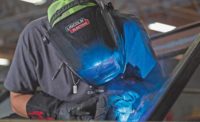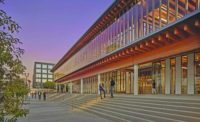Rosendin developed the scope for the project’s two-dimensional drawings and 3D modeling. The firm also acted as the BIM model coordinator, primarily due to the fast pace of the project. Installation was closely coordinated using the BIM model to eliminate clashes with other trades.
Rosendin’s heightened preconstruction planning on Project Cascade reduced the typical construction mind-set of “everyone for themselves,” Dorf says, as well as trades “claiming” installation space. The project included the first large-scale deployment of a new process technology that had not been used in mass production. Consequently, Rosendin and its project partners were tasked with collectively designing, testing and constructing the facility to meet new production requirements.
Besides scheduling trade work, the firm also applied prefabrication protocols that included prefabrication orders issued with drawings.
“When everyone else says, ‘That can’t be done,’ that’s our job,” Greenawalt says.
Southwest Innovations
The development of BIM, prefabrication and lean processes desired by high-tech clients has established the Southwest division of Rosendin Electric as a trendsetter for the company’s global operations.
Currently, the global firm’s BIM professionals are based out of an office adjacent to the Tempe regional headquarters. Opened in April, the facility is called the Rosendin Technology Center. The 25,000-sq-ft headquarters houses the firm’s electrical VDC/BIM, 3D modeling group. It also includes more than 10,000 sq ft of electrical fabrication space and is the home of the instrumentation and controls group and UL listed panel shop. Dorf says the BIM operation runs 24 hours a day to support Rosendin projects around the globe and employs approximately 20 BIM specialists.
“The turning point was the Sheraton Hotel. We decided to do that in-house and it was the best decision we ever made,” says Greenawalt, referring to the downtown Phoenix hotel built from 2006 to 2008 that initiated Rosendin’s investment in BIM.
Besides BIM, the Sheraton project also substantially contributed to the division’s prefabrication efficiencies. The prefab facility is adjacent to the BIM office and has become a bigger part of the firm’s preconstruction work. Dorf says it makes jobs easier and more efficient and allows most jobs to be completed with fewer mistakes. Prefabrication decisions are now a routine part of the bidding process. Dorf says BIM and prefab innovations were initially sparked by regional market conditions. “We may be in the most competitive market in the world,” he says of the Southwest.
The Southwest division is also piloting the integration of lean principles into the firm’s global operations. Led by Dorf and project manager Stephanie Roldan, the firm is not afraid to embrace small failures for the greater good.
“The biggest value [lean] brings is open communication and a level of transparency that allows us to be ready to go,” Roldan says. “To be able to do this, you have to be prepared to fail, but if you’re prepared for that, you will be better for it tomorrow.”
Looking to the Future
According to Greenawalt, one of the biggest underlying factors in the Southwest division’s success—and what will help provide future growth—is the firm’s employee stock ownership program.
“We own this place. At other firms, that term (ESOP) is used loosely, but at Rosendin, there is really a strong sense of pride in ownership,” Greenawalt says. “You need to grow the company to grow your equity. If your company is not growing, you are not doing your job.”
The firm also supports a variety of community-based initiatives such as Junior Achievement of Arizona. In May the firm held a Bowl-A-Thon that raised $13,000.
“Rosendin Electric’s partnership with Junior Achievement of Arizona has enabled thousands of students to receive critical knowledge that will help empower their futures,” says Joss Francheterre, Junior Achievement senior vice president.






